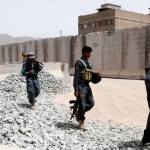
By Mirwais Khan – The Associated Press in the Military Times
The deadly 24 hours for U.S. troops came a day after three British soldiers were killed when one of their Afghan army allies attacked them with gunfire and rocket-propelled grenades. A senior Afghan army officer identified the man as a Shiite Hazara — an ethnic minority usually opposed to the Taliban — and said his motive was still unclear.
In the southern city of Kandahar, a suicide attacker detonated a car bomb late Tuesday night at the gate of the headquarters of the elite Afghan National Civil Order Police, a NATO statement said. Minutes later, insurgents opened fire with machine guns and rocket-propelled grenades.
Three U.S. troops, an Afghan police officer and five civilians died in the attack, but NATO said the insurgents failed to enter the compound.
The special police unit, known as ANCOP, had only recently been dispatched to Kandahar to set up checkpoints along with international forces to try to secure the south’s largest city, the spiritual birthplace of the Taliban.
The dead civilians included three Afghan translators and two security guards, Kandahar provincial police chief Sardar Mohammad Zazai said.
Taliban spokesman Qari Yousef Ahmadi telephoned reporters Wednesday to claim responsibility for the attack. The insurgents, who are prone to exaggerate death tolls inflicted on Afghan and international security forces, claimed 13 international troops and eight Afghan security forces died in the raid.
NATO and Afghan troops are fanning out elsewhere in Kandahar province to pressure insurgents in rural areas. The strategy is to improve security with more and better-trained police and troops so that capable governance can take root and development projects can move forward and win the loyalty of ordinary Afghans.
The Taliban have responded by increasing suicide attacks and bombings, making last month the deadliest for international forces in the war.
Four more American troops were killed Wednesday by a roadside bomb in the south, while one more U.S. service member died the same day of wounds from a gunbattle.
So far in July, 45 international troops have died in Afghanistan, 33 of them Americans.
Also Wednesday, a senior army officer identified the Afghan soldier who turned against his British allies and killed three of them as Talib Hussein, age 22 or 23, from the eastern province of Ghazni.
Hussein is a Hazara, a Shiite Muslim minority, said Gen. Ghulam Farook Parwani, the deputy corps commander for southern forces including those in Helmand.
The identity of the soldier deepened the mystery of his motive, since the Hazara were persecuted by the Taliban — who are made up mostly of ethnic Pashtun Sunni Muslims who see Shiites as doctrinally impure — when the hard-liners ruled Afghanistan during 1996 to 2001 with their extreme interpretation of Islamic law. Very few Hazaras are known to have joined the Taliban insurgency.
Parwani said Hussein was recruited into the army only about eight or nine months ago and had spent most of his time posted in Helmand.
He added that initial investigations indicate Hussein was a habitual hashish smoker. A report to U.S. Congress earlier this year said drug abuse is common among Afghan soldiers, whom international forces are trying to train to take over security and allow a gradual drawdown of foreign troops without fear the Taliban will seize power again.
In other attacks around the country, nine Afghan civilians died in the south when their vehicle hit a roadside bomb in the volatile district of Marjah in Helmand province, the Ministry of Interior said. Another homemade bomb killed two security guards traveling on a road in eastern Paktika province.
Two suspected Taliban also died in Helmand’s Lashkar Gar district when the roadside bomb they were trying to plant exploded prematurely, the ministry said.
Homemade explosives planted in roads and pathways are a leading killer of international forces and also kill hundreds of civilians each year.
ATTENTION READERS
We See The World From All Sides and Want YOU To Be Fully InformedIn fact, intentional disinformation is a disgraceful scourge in media today. So to assuage any possible errant incorrect information posted herein, we strongly encourage you to seek corroboration from other non-VT sources before forming an educated opinion.
About VT - Policies & Disclosures - Comment Policy



